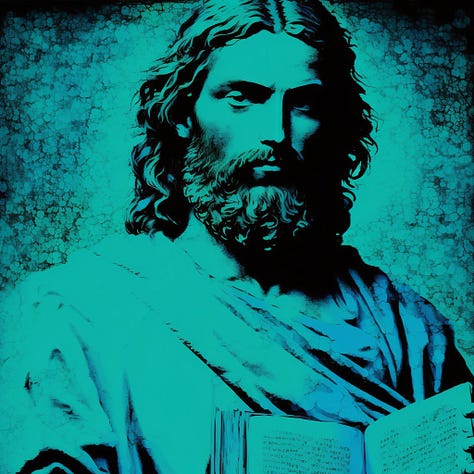Beginnings
The origins of my reading the Bhagavad Gita and the Bible in a year, more or less



In July 2022, I read The Bhagavad Gita, prompted by an Art of Manliness podcast featuring Stephen Cope, author of The Great Work of Your Life. Cope builds his case for work and life transitions around the message of the Gita. I felt especially drawn to the notion of a sacred dharma and Sri Krishna’s admonition that we must do our work and yet we are not entitled to the fruits of that labor. I felt mesmerized and brought more than humble – or less than humble, as it were – in reading the famous chapter 11. In it, Krishna, reveals his full, divine self to Arjuna. Even wearing charmed glasses to enable spiritual vision, the revelation of Krishna’s full holy being blinds Arjuna. He simply cannot take the intensity.
That reading induced me to seek out resources to learn more about the Gita. My friend Sarah Hull suggested attending webinars through Unity Woods Yoga. Graham Schweig, translator of a beautiful version of the Gita, hosted an 18-months long immersion into the Gita. I caught the tail end of that series, which helped bring it to life in new ways for me.
It also led me to Eknath Easwaran’s three-volume set of commentaries on the Bhagavad Gita. Easwaran, a Hindu who came to the United States on a Fulbright Scholarship in 1959, helped spread knowledge and appreciation of Hinduism in the West. And, as the mission of St. Thomas Aquinas was to show the essential compatibility of reason and revelation, to me it seems like Easwaran’s mission was to fuse the critical teachings of the world’s magnificent spiritual traditions into an ecumenical whole – a binding of the spiritual inheritances of humankind, as a way to show our shared spiritual ancestry and unity.
In his commentaries, Easwaran shares one sentence or verse from the Gita and brings examples from modern life to help unfold its lessons. I, at least, have found this approach useful.
Even after a few months, I have only come to chapter 4 of the Gita, or about 15% through the commentaries.
On January 22, 2023 for reasons I may write about later, it struck me that I should read the Bible in its entirety. Even after taking 10 course on theology in college and regularly reading books of theology, metaphysics and philosophy, I felt poorly versed in the key book for Jews, Christians and Muslims. Something – my daemon, the Holy Spirit, the universe – called on me to read the Bible this year.
I decided to use the King James Version. I recalled Wendell Berry writing about it in Blessed Are the Peacemakers:
“The translation I have used is the King James Version, not only because of my love and respect for the language of that version, but also because it is the version that most English-speaking Christians have been reading for the last four hundred years while also disobeyiong or ignoring Christ’s commandments and praying for His help in their wars.”
It seemed unwise to undertake this effort alone. As with the Gita, I sought aid. I asked my more knowledgeable friends and dear priest advisors for resources. They pointed me to the Bible in a Year with Fr. Mike Schmitz podcast. That podcast is based on the Revised Standard Version – Second Catholic Edition of the Bible, specifically The Great Adventure Bible, so I picked up a copy of it too. Fr. Schmitz follows the Bible in a Year Reading Plan. Each episode, he reads that day’s readings and offers a short commentary. For more scholarly analyses, my friends pointed me to The Jerome Biblical Commentary for the Twenty-First Century, and A Catholic Introduction to the Bible: The Old Testament. Friends also suggested the BEMA Podcast.
I began reading the Bible on January 30, 2023. Here is the general routine I follow:
On my way to and from work, I listen to the Bible in a Year podcast. After dinner, I read a verse and commentary from Easwaran. Once my younger daughter falls asleep and my older daughter begins reading, I read that day’s Bible verses from the Bible in a Year Reading Plan.
Today, I will read Day 40. Sometimes, I am a day or two behind or ahead in the readings or the podcast. I catch up over the next day or two. As I look back on the previous 39 days, I have at least read or listen to the podcast every day.
For that day’s passages, I try to read the King James Version and the Great Adventure Bible. It doesn’t always happen that way, but that’s the aim. When I feel drawn to more background, I look up the verses in the Jerome Commentary or Catholic Introduction.
So far, this routine works well for my life and schedule. In future essays, I will reflect on my readings of The Bhagavad Gita and the Bible.
In tomorrow’s essay, I’ll relate how an unexpectedly disappointing podcast featuring two giants of business spurred this inkling to add reading the Bible to my already-underway study of the Gita.
—
Images created by Midjourney.



This is exciting, Russell! I'd be happy to chat Bible things with you any time. I've read it many times since becoming a Christian 12 years ago, and I'm always interested in digging deeper. :) I highly recommend Strong's Exhaustive Concordance for looking up words and their meanings.
I love the revelation that we are not put here for maximum productivity - and then the segue to reading the Bible, a tome of riddles and fiction that scholars have struggled to unlock for centuries. Sort of like arbitrarily adding weight to your back to go out and take a walk. Perfect.